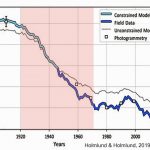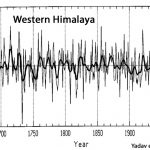- Joined
- Mar 6, 2019
- Messages
- 26,292
- Reaction score
- 23,984
- Location
- PNW
- Gender
- Male
- Political Leaning
- Other
Boy does That leave open a world of possibilities..... for some reason that I can't think of...
Boy does That leave open a world of possibilities..... for some reason that I can't think of...
And for that amount of glacial ice you need a large thickness of it. Where do you suggest we look for it. Try finding it on Google maps.
Boy does That leave open a world of possibilities..
You know Google Maps isn't live imagery, right?
I think that's what you meant...You think you need the information..... for it to be valid?
Choose the biggest you can find, let's work out how big it is.
I think that's what you meant...
Tim, please, engage your brain before you start typing. It will go better for everybody.
have at it...now that you know to look for Canadian ice. :roll:
You are making the claim that there is lots of ice, enough to last more than 10 years at a loss rate of 200Gt/yr. Well where is all this ice?
(National Resources Canada).Canada’s landmass and climate supports approximately 20% of the Earth’s glacier ice volume excluding the Antarctic and Greenland ice sheets. Outside of the ice sheets of Antarctica and Greenland, Canada has more glacier coverage in the form of mountain glaciers, icefields and ice caps than any other nation.
Glaciers in this region have become the 3rd largest contributor to global sea-level rise outside of the Antarctic and Greenland ice sheets. Run-off from glaciers in this region also impact local streamflow and freshwater fluxes into the Arctic Basin.
Melting...
Why is it that everything had to be a challenge to somebody else? Why is it that someone else has to "disprove" something you just claim to "know"? Do you have any personal curiosity? It took me, literally, nanoseconds to find a dozen articles on Canada's glacial ice fields. That's what I mean by "engaging".
From National Resources Canada article: The latest published estimate of water equivalent mass loss from Canada’s Arctic glaciers is 60 +/- 4 Gt a-1 between 2003 – 2009 (Gardner et al, 2013) compared with 81 +/- 37 Gt a-1 and 263 +/- 30 Gt a-1 loss from the Greenland and Antarctic Ice sheets respectively between 2005-2010 (Shepard, 2012)
Based on long-term annual glacier mass balance series' and glacier volumetric change data derived from repeat glacier inventory efforts, a coupled mass balance - regional glacier dynamics model was used to simulate future glacier changes under the influence of IPCC scenario A1-b climate. The projections suggest that glaciers on the eastern slopes of the Canadian Rocky Mountains will lose 80-90% of their volume by 2100, while glacier contributions to streamflow in Alberta will suffer an order of magnitude reduction (Marshall et al., 2011).
I engage the northern part of my body, rather than the southern where it appears you site your knowledge.
No actual place which has a lot, more than 100Gt, of ice then?
 [h=2]New Paper: Sweden Glaciers GAINED Mass From 1970-2001 After Rapid 1920s-’60s Retreat[/h]By Kenneth Richard on 1. April 2019
[h=2]New Paper: Sweden Glaciers GAINED Mass From 1970-2001 After Rapid 1920s-’60s Retreat[/h]By Kenneth Richard on 1. April 2019 [h=2]Arctic Glaciers ADVANCED 16 km During 2008-2016 In A Region That Was 6°C Warmer ~9,000 Years Ago[/h]By Kenneth Richard on 20. December 2018
[h=2]Arctic Glaciers ADVANCED 16 km During 2008-2016 In A Region That Was 6°C Warmer ~9,000 Years Ago[/h]By Kenneth Richard on 20. December 2018 [h=2]Observations Show No Warming Trend, Mostly Stable Glaciers In The Himalayas…Contradicting IPCC’s ‘Fake News’[/h]By Kenneth Richard on 23. February 2017
[h=2]Observations Show No Warming Trend, Mostly Stable Glaciers In The Himalayas…Contradicting IPCC’s ‘Fake News’[/h]By Kenneth Richard on 23. February 2017I think that's what you meant...
Tim, please, engage your brain before you start typing. It will go better for everybody.
My position is that there in not much glacial ice in Canada. Less than 2,000Gt. You can presumably find evidence to show me wrong. Go for it.
Yes, Canada has glacial ice fields. None of which have a thousand cubic kilometers of ice in them.
Please engage your brain enough to understand that it is a mater of volume, a bit of maths, that is needed.
WTF?
A google search gives you an answer immediately?
Why ask questions that are easy to look up? Lazy or stupid is the obvious explanation usually, but I’ll give you the benefit of the doubt and let you answer.
(FYI. To see the answer, you must click on the underlined text below. But beware, to get back to this page, you might need to click the ‘back’ button on your browser. Let me know if you need any more help if this is too challenging)
Glaciers in Canada | The Canadian Encyclopedia
[h=2]Observations Show No Warming Trend, Mostly Stable Glaciers In The Himalayas…Contradicting IPCC’s ‘Fake News’[/h]By Kenneth Richard on 23. February 2017
IPCC Intentionally Uses Catastrophic Non-Science To Incite Policy Action “The most striking feature of the present reconstruction is the absence of any warming trend in the 20th century” — Yadav et al., 1997 Bhattacharyya and Chaudhary, 2003 In 2007, IPCC Claimed The Himalayan Region Has Been Warming So Rapidly Its Glaciers Would ‘Disappear’ By […]
I provided a link earlier. Here's the data that was ignored:Where did you come up with 1000 cubic kilometers? You seem to be off by a ****load. Probably because you're **** at math. Remember when you invented numbers and did the math wrong to come up with biofuel deaths?
Let's see, a little slow math here... 200,000 square kilometers, and the depth of the glaciers reach "240-to-1,400-metre" thick, averaging... whatdyaknow... a kilometer. (Arctic glaciers can reach over 4.5 km deep) In the United States, glaciers cover over 75,000 square kilometers.In Canada, glaciers and ice caps are found in the Arctic where they occupy ~150,000 km2 of the Queen Elizabeth Islands, Baffin Island, and Bylot Islands, and in the Western and Northern Cordillera region which supports ~50,000 km2 of glacier coverage.
